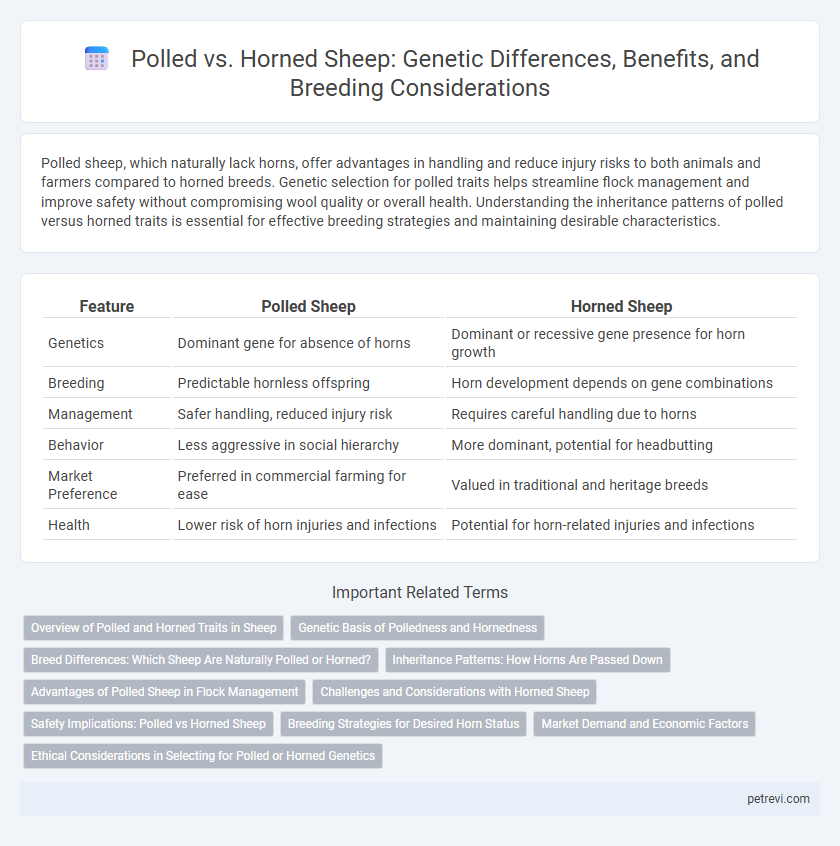Polled sheep, which naturally lack horns, offer advantages in handling and reduce injury risks to both animals and farmers compared to horned breeds. Genetic selection for polled traits helps streamline flock management and improve safety without compromising wool quality or overall health. Understanding the inheritance patterns of polled versus horned traits is essential for effective breeding strategies and maintaining desirable characteristics.
Table of Comparison
| Feature | Polled Sheep | Horned Sheep |
|---|---|---|
| Genetics | Dominant gene for absence of horns | Dominant or recessive gene presence for horn growth |
| Breeding | Predictable hornless offspring | Horn development depends on gene combinations |
| Management | Safer handling, reduced injury risk | Requires careful handling due to horns |
| Behavior | Less aggressive in social hierarchy | More dominant, potential for headbutting |
| Market Preference | Preferred in commercial farming for ease | Valued in traditional and heritage breeds |
| Health | Lower risk of horn injuries and infections | Potential for horn-related injuries and infections |
Overview of Polled and Horned Traits in Sheep
Polled and horned traits in sheep are determined by distinct genetic variations, with polled sheep exhibiting a dominant allele that suppresses horn growth, while horned sheep carry recessive alleles allowing horn development. The polled trait is particularly common in domestic breeds such as the Dorset and Suffolk, favored for ease of management and reduced injury risk. Understanding the inheritance patterns of these traits enables selective breeding practices to optimize flock characteristics and improve animal welfare.
Genetic Basis of Polledness and Hornedness
The genetic basis of polledness and hornedness in sheep is determined primarily by specific alleles on the RXFP2 gene located on chromosome 10. Polled sheep inherit dominant alleles that suppress horn growth, whereas horned sheep carry recessive alleles allowing normal horn development. Understanding this genetic differentiation aids breeders in selecting for desired traits, optimizing flock management and breeding programs.
Breed Differences: Which Sheep Are Naturally Polled or Horned?
Breed differences in sheep genetics determine whether a sheep is naturally polled (hornless) or horned, with breeds like Dorset, Suffolk, and Texel typically polled, while Jacob, Jacob sheep, and Navajo-Churro often exhibit horns. The presence or absence of horns is controlled by specific genes, such as the polled locus (P) and the horned locus (H), influencing the sheep's physical traits and breeding purposes. Understanding these genetic variations aids in selective breeding programs targeting desired traits for wool production, meat quality, and animal handling.
Inheritance Patterns: How Horns Are Passed Down
Horn inheritance in sheep is primarily determined by specific genes such as the polled locus, where the polled (hornless) allele is often dominant over the horned allele. In breeds like Dorset and Suffolk, horned traits follow a simple Mendelian pattern, while in others such as Jacob sheep, complex polygenic factors influence horn presence and size. Understanding the genetic mechanisms behind polled versus horned sheep assists breeders in predicting offspring traits and managing flock genetics effectively.
Advantages of Polled Sheep in Flock Management
Polled sheep, which naturally lack horns, offer significant advantages in flock management including reduced risk of injury to handlers and other sheep, minimizing flock stress and damage. Their easier handling and lower maintenance needs enhance safety and efficiency in routine tasks like shearing, feeding, and transportation. Selecting for polled genetics supports improved animal welfare and streamlines operational processes on sheep farms.
Challenges and Considerations with Horned Sheep
Horned sheep present unique challenges in breeding due to increased risk of injury to other animals and handlers, as well as management difficulties in confined spaces. Genetic selection for polled traits reduces the prevalence of horns, promoting safer handling and easier housing but may limit genetic diversity if not managed carefully. Consideration of horn genetics is crucial to balance animal welfare, breeding goals, and maintaining robust flock health.
Safety Implications: Polled vs Horned Sheep
Polled sheep, genetically lacking horns, significantly reduce injury risks for handlers and flock members compared to horned sheep, which can cause goring or bruising during close contact or confined handling situations. Selecting polled genetics enhances farm safety by minimizing aggressive behaviors and physical hazards associated with horns, leading to easier management and fewer veterinary interventions. This safety advantage makes polled sheep genes highly valuable for improving animal welfare and operational efficiency in flock management.
Breeding Strategies for Desired Horn Status
Breeding strategies for desired horn status in sheep emphasize selecting polled or horned rams and ewes based on their genetic markers, particularly the POLLED and HORNED alleles influencing horn development. Implementing controlled mating with genotyped individuals ensures offspring inherit preferred traits, supporting traits such as ease of handling with polled sheep or breed-specific conformation with horned sheep. Utilizing genomic testing accelerates identification of carrier animals, optimizing breeding programs to reliably produce sheep with desired horn phenotypes.
Market Demand and Economic Factors
Polled sheep, lacking horns due to genetic traits, are increasingly favored in commercial markets for their ease of handling and reduced injury risk, driving higher demand among livestock producers. Horned sheep, while sometimes preferred for traditional breeds, often incur greater management costs and lower market prices due to challenges in shearing and transport. Economic factors, including labor efficiency and animal welfare considerations, prioritize polled genetics in breeding programs to maximize profitability and meet consumer preferences.
Ethical Considerations in Selecting for Polled or Horned Genetics
Selecting for polled or horned genetics in sheep involves ethical considerations related to animal welfare and management practices. Polled sheep, which lack horns, reduce injury risks among flock members and handlers, promoting safer husbandry conditions. However, breeding solely for polled traits may reduce genetic diversity and inadvertently impact other important traits, necessitating a balanced breeding approach prioritizing both welfare and overall genetic health.
Polled vs Horned for Sheep Genetics Infographic

 petrevi.com
petrevi.com